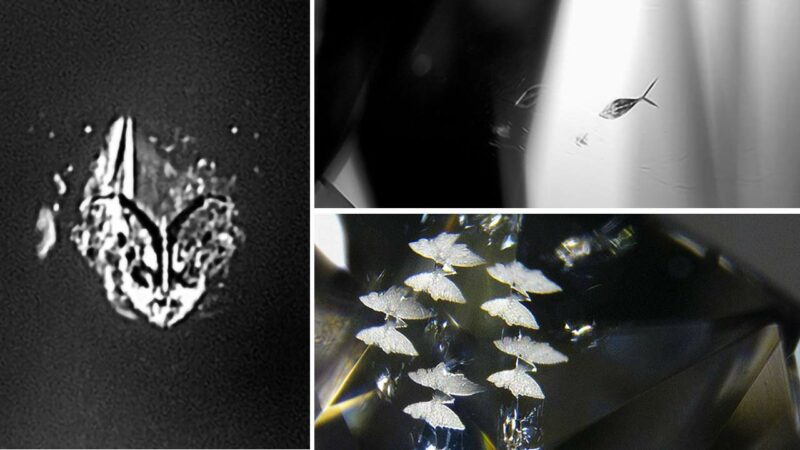In the Fall edition of Gems & Gemology, the Gemological Institute of America (GIA) shared findings on three natural diamonds with unusual inclusions creating animal and mask-like visual forms.
While inclusions may be common, the distinct shapes observed in these diamonds — a butterfly, a fish, and a theatre mask — are rarely seen. The GIA’s observations highlight how natural inclusions can become a point of interest, potentially appealing to jewellers and clients seeking nature-inspired or one-of-a-kind jewelry.
Butterfly Kaleidoscope and Tiny Fish
One of the diamonds graded by the GIA, a 1.55-carat, G-color, I1-clarity round stone, contained a feather inclusion that created a kaleidoscope-like effect. The inclusion was visible through the crown, with reflections from the bezel facets forming five overlapping prism images. GIA described this as a “kaleidoscope of butterflies,” offering jewellers a natural design feature for clients who may appreciate unique gemstones.
Another diamond, a smaller 0.30-carat, F-color, VS2-clarity round, contained a feather inclusion in the table that, along with its reflection, resembled a “tiny fish.” The GIA noted that such recognisable shapes are uncommon, giving jewellers the chance to showcase an organic, nature-inspired feature.
Theatrical Mask Formation in Diamond Inclusion
A third diamond, a 0.90-carat, F-color, VS2-clarity, type Ia stone, contained a feather inclusion that, when viewed from the pavilion, formed a shape resembling a theatre mask. This type of formation adds a notable visual detail that jewellers may find useful for clients interested in symbolic or unique motifs.
While inclusions are sometimes thought of as a diamond’s unique fingerprint, giving each stone its own distinct identity, these recent discoveries add an extra layer of intrigue and rarity. These diamonds offer a unique talking point: natural formations that can’t be replicated, allowing clients to own a gemstone with a truly singular character shaped by nature itself.






